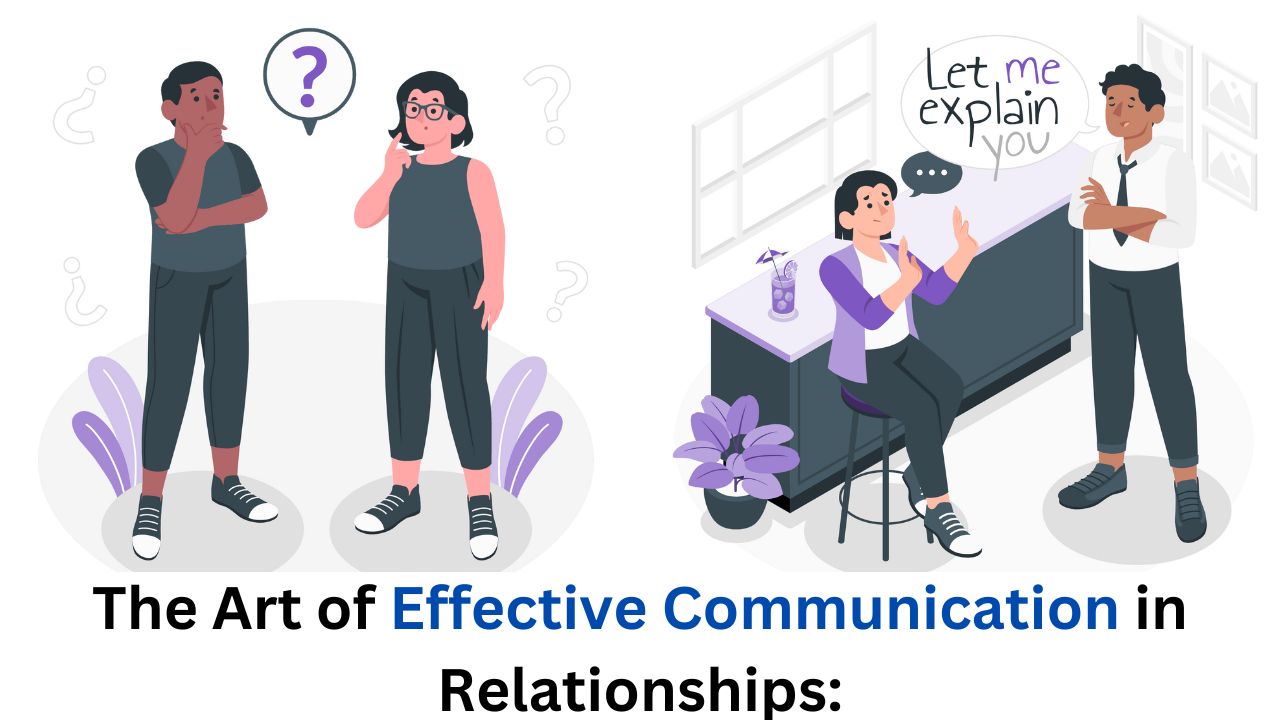Unlock the secrets to successful relationships with ‘The Art of Effective Communication in Relationships:’ guide.
Enhance your relationship skills and create lasting connections with expert insights.
Start your journey towards meaningful connections today!
The Art of Effective Communication in Relationships: Building Strong Connections
Effective communication is the cornerstone of any successful relationship, be it romantic, familial, or professional. It forms the basis for understanding, intimacy, and collaboration.

However, mastering the art of communication is no easy task. It requires patience, empathy, and a willingness to listen and understand.
In this article, we will explore the key principles and techniques of effective communication in relationships, empowering you to foster deeper connections and healthier interactions.
1. Cultivating Active Listening:
One of the fundamental elements of effective communication is active listening. It involves giving your full attention to the speaker, allowing them to express themselves without interruption or judgment.

Practice the following techniques to enhance your listening skills:
- Maintain eye contact and open body language.
- Reflect on the speaker’s words and emotions, showing empathy and understanding.
- Ask clarifying questions to ensure you grasp their perspective.
2. Expressing Yourself Clearly:
Effective communication is a two-way street. It’s crucial to express yourself clearly and assertively while remaining respectful.

Consider the following tips for expressing your thoughts and feelings effectively:
- Use “I” statements to express your emotions and needs without blaming the other person.
- Be mindful of your tone and body language, aiming for a calm and non-confrontational approach.
- Choose the right time and place for discussion, ensuring both parties are in the right frame of mind.
3. Honoring Non-Verbal Communication:
Communication extends beyond words. Non-verbal cues, such as facial expressions, gestures, and posture, play a significant role in conveying meaning.

To communicate effectively:
- Pay attention to your non-verbal cues and ensure they align with your verbal message.
- Interpret the non-verbal cues of others to gain a deeper understanding of their emotions and intentions.
- Be mindful of cultural differences in non-verbal communication, as gestures and body language can vary.
4. Developing Emotional Intelligence:
Emotional intelligence is the ability to recognize, understand, and manage your own emotions and the emotions of others. It greatly influences the quality of communication in relationships.

Here are some ways to develop emotional intelligence:
- Practice self-awareness by reflecting on your emotions and triggers.
- Empathize with others by putting yourself in their shoes and acknowledging their feelings.
- Use emotional vocabulary to articulate your emotions and encourage open dialogue.
5. Constructive Conflict Resolution:
Conflict is an inevitable part of any relationship. However, how we approach and resolve conflicts can make all the difference.

Follow these steps for constructive conflict resolution:
- Approach conflicts with a mindset of finding a mutually beneficial solution rather than assigning blame.
- Use active listening and assertive communication to express your perspective and understand the other person’s point of view.
- Look for common ground and explore compromises that address the needs of both parties.
Navigating Long-Distance Love: 6 Tips for Successful Relationship
Benefits of effective communication in a relationship:
Effective communication in relationships offers numerous benefits that contribute to the overall health and happiness of the individuals involved.
Here are some key benefits:
- Enhanced Understanding: Effective communication allows individuals to truly understand each other’s thoughts, feelings, and perspectives. It promotes clarity and reduces misunderstandings, leading to deeper connections and a stronger bond.

- Strengthened Emotional Intimacy: When partners or family members communicate effectively, they create an environment of trust, openness, and vulnerability. Sharing emotions, desires, and dreams fosters a deeper emotional connection and intimacy.

- Improved Problem-Solving: In relationships, problem-solving is essential for growth and progress. Effective communication enables individuals to express their concerns, brainstorm solutions, and work together to find effective resolutions. It promotes collaboration and strengthens the partnership.

- Increased Relationship Satisfaction: When individuals feel heard, understood, and valued, their overall satisfaction in the relationship improves. Effective communication nurtures a sense of validation and appreciation, leading to greater relationship fulfillment.

- Reduced Stress and Frustration: Miscommunication and unresolved conflicts can create stress and frustration within relationships. Effective communication helps alleviate these negative emotions by fostering open dialogue, promoting understanding, and addressing concerns promptly.

- Supportive Environment: Effective communication creates a safe and supportive environment where individuals feel comfortable expressing their needs, fears, and aspirations. It encourages active engagement, empathy, and validation, fostering an atmosphere of mutual support and care.

- Strengthened Trust: Trust is the foundation of any healthy relationship. Effective communication builds trust by promoting transparency, honesty, and authenticity. When individuals communicate openly and honestly, trust is deepened and the relationship becomes more resilient.

- Enhanced Collaboration: Effective communication is essential in collaborative efforts, whether it’s raising a family, managing a household, or working on a project together. Clear and respectful communication enables individuals to work towards shared goals, make decisions collectively, and distribute responsibilities equitably.

- Long-Term Relationship Success: Relationships built on effective communication have a higher likelihood of long-term success. When individuals prioritize open and honest communication, they can navigate challenges, adapt to changes, and grow together, fostering a strong and lasting partnership.

It is an essential skill set that contributes to the overall health and happiness of individuals and their relationships.
Conclusion:
Effective communication is an art that requires practice, patience, and a genuine desire to connect with others.
By cultivating active listening, expressing yourself clearly, honoring non-verbal communication, developing emotional intelligence, and engaging in constructive conflict resolution, you can strengthen your relationships and foster deeper connections.
Remember, effective communication is a continuous journey, and with each interaction, you have the opportunity to create a more harmonious and fulfilling relationship.
Other Interesting Posts to Read:
The Art of Apologizing and Forgiving in Relationships
Navigating Long-Distance Relationships: Dos and Don’ts
6 Effective Communication Tips for Building Stronger Relationships


